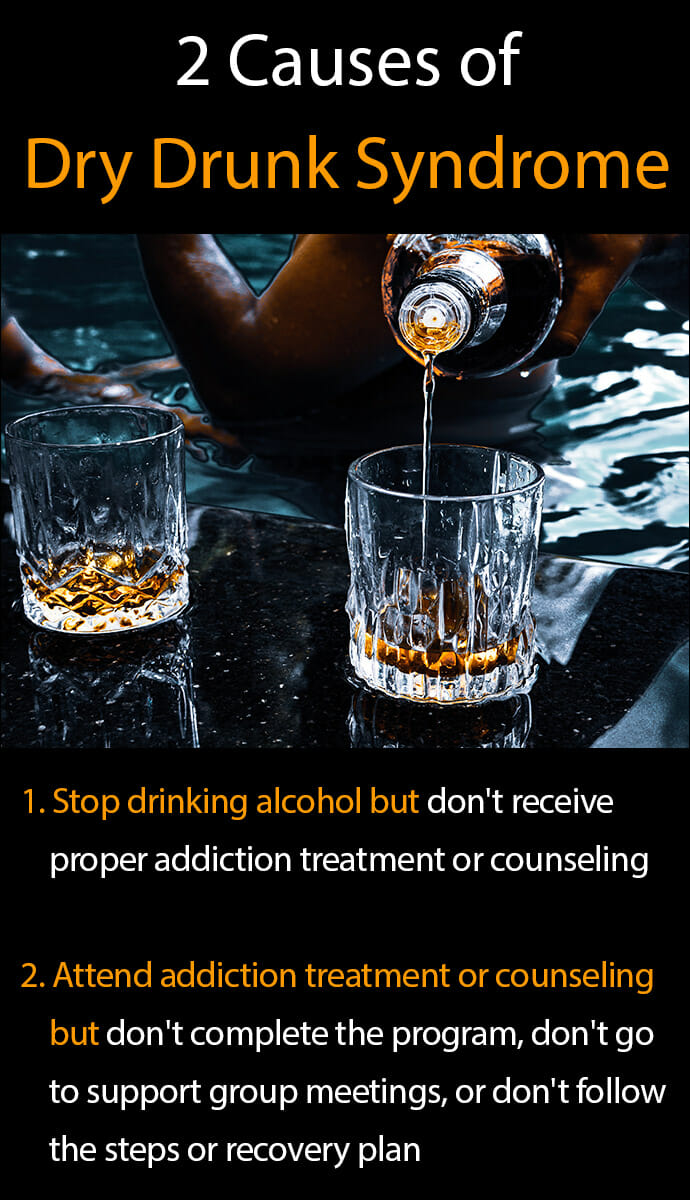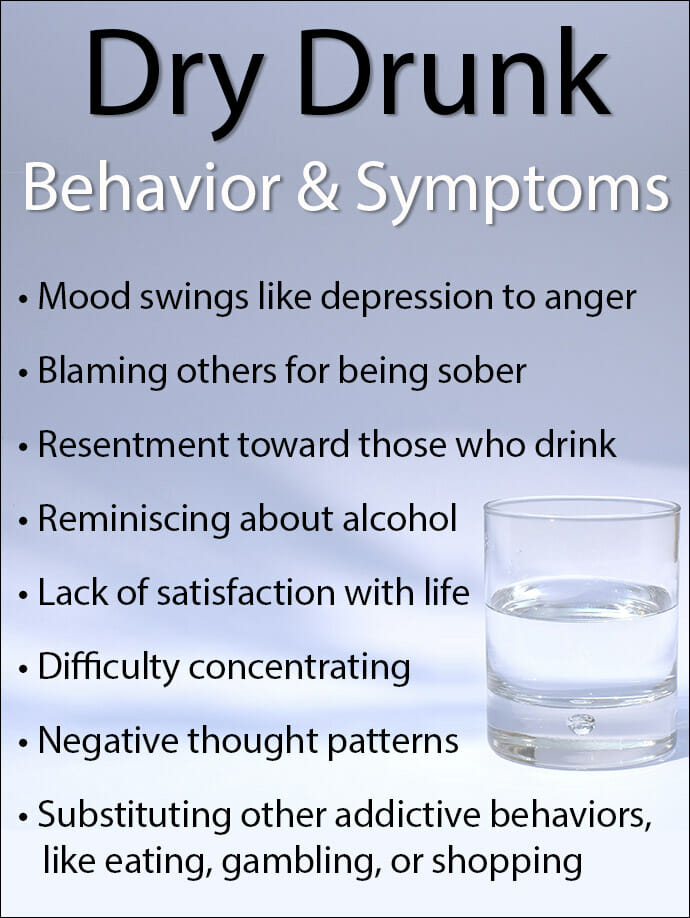Table of Contents
Dry Drunk is a term that some people consider to be disrespectful, while others honestly don’t understand the meaning behind it.
Recovery from an alcohol use disorder, or any type of substance dependence for that matter, can be a hard fought battle. It’s often a more complex process than simply giving up alcohol or drugs and just staying sober.
Many people struggling with addiction who to attempt to “white knuckle” sobriety on their own without help or proper treatment may experience the same emotional and psychological problems they did while drinking and using drugs.
This is sometimes referred to as dry drunk behavior and it describes a very real condition faced by some in recovery. Despite the negative-sounding label, it is used to describe characteristics people may understand rather than show disrespect.
What is a Dry Drunk?
Dry drunk syndrome is a term sometimes used in addiction recovery and not an actual diagnosis, although it is still a real issue. The slang phrase “dry drunk syndrome” got its start in the early 12-step recovery community.
A dry drunk is essentially a person who is sober, meaning he or she has stopped drinking altogether, but they are still exhibiting many of the same behaviors as when they were still drinking alcohol.
Quitting drinking may solve one part of the problem, and it’s a big one. But if there is a root cause or reason why a person was drinking that is not addressed, other negative emotions and behaviors may continue.
Dry Drunk Behavior can include:
- Poor decision making abilities
- Difficulty maintaining relationships
- Mood swings
What’s most important to understand about this condition is that those battling these problems may very likely be on the precipice of a relapse. Many types of dry drunk behavior can be seen as a sign that someone needs help.
Causes of Dry Drunk Syndrome
Anyone in addiction recovery, even those with significant time in sobriety, can be at risk of dry drunk syndrome.
Two of the primary causes include the following:
- Anyone who gave up alcohol on their own, due to an ongoing, problematic dependency that caused negative consequences, but never received any type of addiction treatment or counseling
- Those who received treatment for an alcohol use disorder, but quit attending counseling sessions, going to support groups, or never received relapse prevention therapy because they possibly felt that simply staying sober was sufficient
In each situation, the underlying causes of addictive behavior were never addressed and treated.
As a result, people battling dry drunk behavior may still be coping with unaddressed trauma, anxiety, or depression that often drives substance use and dependence.
In fact, many people use alcohol to self-medicate psychological issues like past trauma, depression, and other mental health issues. So, in the absence of that, a person exhibiting a dry drunk personality may be in more emotional pain and turmoil than they were while self-medicating with alcohol.
For loved ones who may have thought total sobriety would fix the problems in their relationships, dry drunk syndrome can sometimes make matters even worse. It can feel as if the issues they were hoping to address are insurmountable.
Dry Drunk Behavior and Symptoms
Because every person is different, the dry drunk symptoms and behavior experienced by one individual are usually not likely to be exactly the same as the symptoms exhibited by other people.
Still, there are general markers that those in recovery should be on the lookout for in their own behavior, as well as signs that loved ones and friends may also be able to identify.
Some of the symptoms of dry drunk behavior can include:
- Intense mood swings, from depression to anger and back
- Self-pity, in the sense of being a victim or blaming others for not being able to drink any longer
- Isolating oneself from loved ones or contacts in recovery and feeling resentful toward them
- Indulging in a sense of nostalgia for past drinking days, talking about it more often, seeking out old friends, or even going to past drinking haunts
- A sense of numbness or lack of satisfaction with life
- Difficulty concentrating or breaking negative thought patterns
- Substituting alcohol or drugs with other addictive behaviors, like eating, gambling, sex, or shopping
For those with some time in recovery, it may be easier to spot the symptoms, especially if they have supportive people around them.
However, for those new to sobriety, the symptoms can feel incredibly challenging because they may not understand there is a psychological and emotional recovery beyond just giving up alcohol or drugs.
Dry Drunk Recovery
Those who make the decision to quit drinking should be commended and celebrated for their efforts.
First and foremost, anyone battling an alcohol use disorder, even those who have stopped drinking for a period on his or her own, still needs support and compassion in their recovery.
It’s definitely possible to wake up one day and commit to being sober, and many people are successful at doing this.
For others, giving up alcohol “cold turkey,” depending on the advancement of a person’s condition can even be dangerous and lead to a serious issue like Delirium Tremens caused by alcohol withdrawal.
Delirium Tremens is a very severe condition usually only experienced by heavy or long-term drinkers and can be quite rare.
Post-Acute Withdrawal Syndrome (PAWS) is another condition associated with quitting alcohol and drugs, and is a more common reason for concern.
Some people who quit using substances without proper treatment might not struggle with withdrawal, but they may still need help dealing with past demons or the root causes of their addiction in the first place.
Addiction Treatment for Recovery
If quitting drugs or alcohol hasn’t worked as expected, seeking help from an addiction treatment facility might be in order.
It may be necessary to enter treatment in a professional setting and really focus on psychological healing and undergo cognitive behavioral therapy and other therapies that provide the tools to address dry drunk symptoms and patterns.
Professional treatment facilities provide a safe and medically monitored place to help ease the symptoms of physical withdrawal.
Once detox is completed, the next step is to begin one-on-one therapy, group sessions, family counseling if appropriate, and other recovery programs.
An alcohol treatment program will identify and treat the root causes of a person’s drinking, and address any undiagnosed mental health issues.
For many people, this may be the only way to avoid falling into dry drunk behavior, or overcome the symptoms if they arise.
There’s no shame in reaching out for help, and quitting alcohol is only half the battle. Sometimes it’s necessary to rely on the experience of treatment professionals for a complete and successful recovery.





